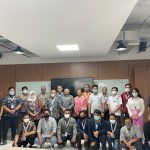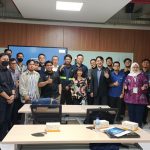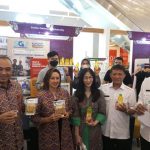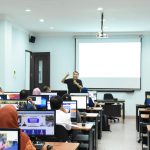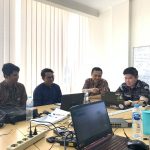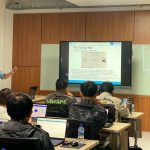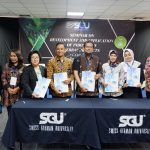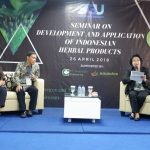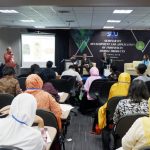Aditya Bhatara

In an effort to strengthen the local economy, Swiss German University (SGU) and Tangerang Regency’s Regional Development Planning Agency (Bappeda) inked a significant Cooperation Agreement (PKS) on September 4, 2024. Dr. H. Ujang Sudiartono, M.T., Head of the Tangerang Regency’s Regional Development Planning Agency, and Assoc. Prof. Ir. James Purnama, M.Sc., Director of Academic Research and Community Service (ARCS) SGU, signed this agreement. After that, there was a Focus Group Discussion (FGD) on the topic “Economic Improvement in Tangerang Regency through Processed Mangrove Products, Candle Nut Oil, and Tempe Semangit.”
The FGD presented various parties from six main sectors, commonly known as the Hexa Helix concept, which includes the government, academia, industry players, the community, media, and financial institutions. The presence of Dra. Hj. Anna Ratna, M.Si., Head of the Cooperatives and Micro Business Office of Tangerang Regency, Mr. Miftah, Head of East Sepatan Subdistrict, as well as representatives from the Manpower Office, Social Services Office, Community Empowerment and Village Development Office, and Trade Office of Tangerang Regency signifies the importance of this event in the regional development strategy.

The Hexa Helix concept is the main focus of this discussion, where the involvement of various sectors is essential to maximize the economic potential of Tangerang Regency, particularly through processed products based on local resources such as mangroves, candlenut oil, and tempe semangit. This collaboration is expected not only to enhance the welfare of the community but also to strengthen economic resilience at the local level.
SGU is committed to integrating academic research with the needs of society and industry. In his speech, Assoc. Prof. Ir. James Purnama, M.Sc. stated that this collaboration is a strategic step in promoting the development of research-based products that can be directly applied in the field. “SGU believes that innovations born from the collaboration between academics, the government, and the community have great potential to transform the regional economy,” he said.
Dr. H. Ujang Sudiartono, M.T., in his speech, emphasized the importance of the local government’s role in facilitating such collaborations. According to him, sustainable economic development can only be achieved if all parties are actively involved and support each other. “Tangerang Regency has a lot of potential that has not been fully utilized. With support from SGU and collaboration from various sectors, I am confident we can maximize this potential for the common good,” said Ujang.

The discussion in the FGD focused on three flagship products resulting from the research of SGU lecturers: processed mangrove products, candle nut oil, and tempe semangit.
Kholis Abdurachim Audah, M.Sc., Ph.D., a lecturer at SGU who has conducted in-depth research on the potential of mangroves along the coast of Tangerang Regency, explained that mangroves not only serve as an ecosystem buffer but also have high economic value. “Processed mangrove products, such as health foods and beverages, as well as mangrove-based beauty products, have a very promising market,” he stated. He also emphasized the importance of training for coastal communities to process mangroves into value-added products.
Tabligh Permana, M.Si., presented on candlenut oil, explaining that candlenut is one of the local commodities that has various benefits, especially in the beauty and health industries. Research conducted by SGU shows that candlenut oil from Tangerang Regency has a very high content of omega 3, 6, and 9, which can be further developed into a competitive product in the international market.
In addition, Tabligh Permana, M.Si., also presented the product of tempe semangit, which is also the result of research by SGU lecturers, introduced as an innovation in soybean-based food processing. Tempeh with a strong aroma, which has unique characteristics due to its advanced fermentation process, is believed to be an attractive product for a wider market, including the export market. Permana Tabligh added that fermented tempeh can be developed into various derivative products, such as cooking spices and healthy snacks, which are high in protein.
Tabligh Permana, M.Si., presented on candlenut oil, explaining that candlenut is one of the local commodities that has various benefits, especially in the beauty and health industries. Research conducted by SGU shows that candlenut oil from Tangerang Regency has a very high content of omega 3, 6, and 9, which can be further developed into a competitive product in the international market.
In addition, Tabligh Permana, M.Si., also presented the product of tempe semangit, which is also the result of research by SGU lecturers, introduced as an innovation in soybean-based food processing. Tempeh with a strong aroma, which has unique characteristics due to its advanced fermentation process, is believed to be an attractive product for a wider market, including the export market. Permana Tabligh added that fermented tempeh can be developed into various derivative products, such as cooking spices and healthy snacks, which are high in protein.

The signing of the MoU and discussions in this FGD are expected to be the beginning of various collaborative programs between SGU and the Tangerang Regency Bappeda. This event also provides an opportunity for participants to exchange ideas and strengthen networks across sectors. With a strong spirit of collaboration, it is hoped that it can enhance the regional economy and improve the welfare of the local community.


